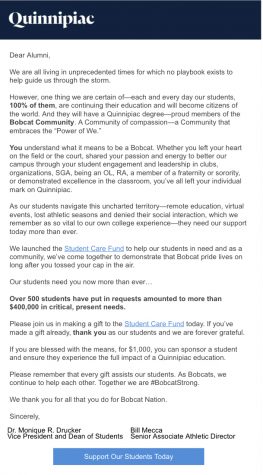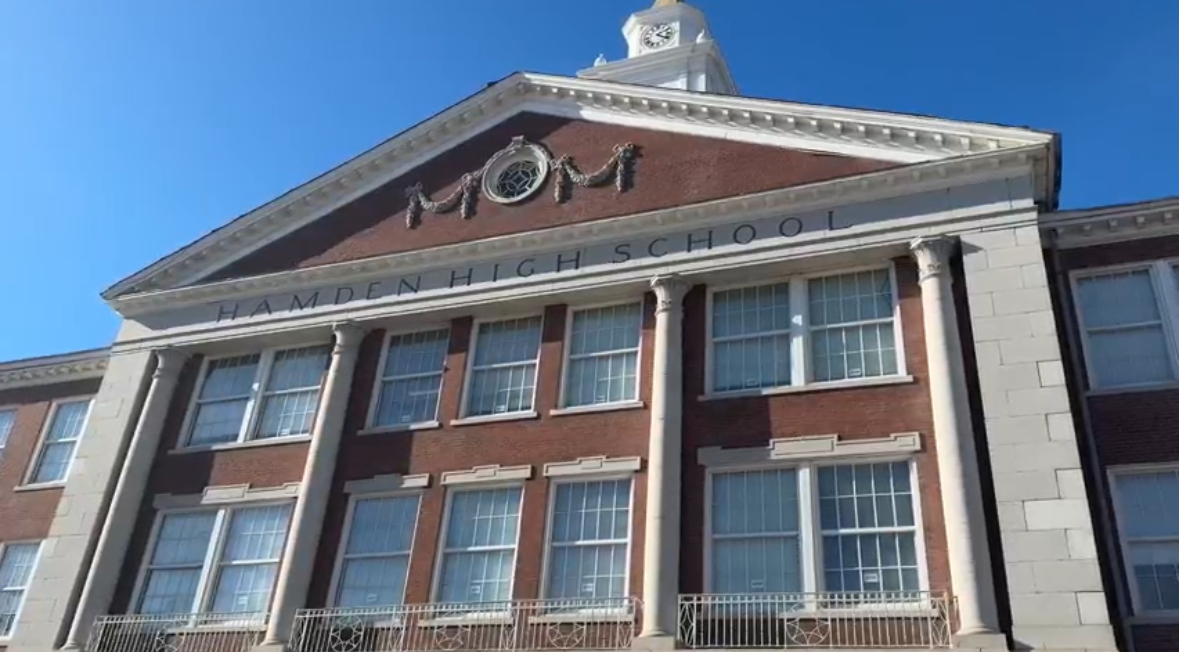The CARES Act: Colleges and universities receive grants in wake of COVID-19
How much money will Quinnipiac receive?

April 9, 2020
Colleges and universities across the country are dealing with the financial impact of students not living on campus anymore, instruction online and other economic issues due to the coronavirus.
Congress passed a bipartisan stimulus bill which is providing financial aid to institutions of higher education and students impacted by the coronavirus outbreak. This bill will send approximately $14 billion to colleges and universities across the country. Quinnipiac will receive a total of $5,345,199 with a minimum allocation of $2,672,600 to be awarded for emergency financial aid grants to students. The total amounts allocated to each college or university can be found here.
Quinnipiac is still figuring out a plan for how the money will be allocated.
“We are still reviewing the details of the stimulus package to better understand how the funds that may be allocated to Quinnipiac can be used to assist the financial needs of both students and the university,” Vice President for Marketing and Communications Daryl Richard said.
According to a press release on April 9, from the U.S. Department of Education, U.S. Secretary of Education Betsy DeVos announced that $6.28 billion will immediately be distributed for institutions to provide emergency cash to students whose lives and education have been disrupted by the coronavirus outbreak. This includes things such as course materials, technology, food, housing, health care and childcare.
“What’s best for students is at the center of every decision we make,” DeVos said. “That’s why we prioritized getting funding out the door quickly to college students who need it most. We don’t want unmet financial needs due to the coronavirus to derail their learning.”
This money comes from the Education Emergency Relief Fund having permission from the Coronavirus Aid, Relief and Economic Security (CARES) Act. President Donald Trump signed this into law less than two weeks ago.
The amount of money allocated to each school was determined by a formula written in the CARES Act. This significantly weighs the number of full-time students who are eligible for Federal Pell Grants, as well as the total number of students who were not previously enrolled full-time online. This calculation was determined using the Integrated Postsecondary Education Data System (IPEDS) and Federal Student Aid (FSA).
Federal student loan relief is also being provided, as interest rates will be set to zero percent and allows payments to be postponed for 60 days without interest. The CARES Act extends these to six months.

Along with the federal aid, Quinnipiac created its own Student Care Fund. Students who are experiencing financial hardships as a result of COVID-19 are invited to apply for this using the online request form. The funds are awarded as a grant and do not need to be repaid. Applications will be reviewed by the Office of Financial Aid and funds will be awarded by the Dean of Students Office. The most that a single student can receive is $1,000. Over 500 students have requested more than $400,000 in critical needs, according to an email sent to Quinnipiac alumni from Vice President and Dean of Students Monique Drucker and Senior Associate Athletic Director Bill Mecca on Tuesday, March 31. As of Thursday, April 9, $168,315 has been raised from 266 donors.
Quinnipiac has promised to refund students for a portion of their housing and meal plans. Seniors will receive this in refunds and all other students will be credited in next year’s bill. The amount(s) that students will receive has yet to be announced.
—
Updated April 10, 2020 at 7:30 p.m.






